Movfor
Movfor dosages: 200 mg
Movfor packs: 40 caps, 80 caps, 120 caps, 160 caps, 200 caps
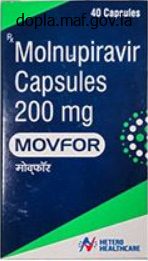
Order generic movfor line
The acute clinical illnesses caused by the five hepatitis viruses (A-E) range from asymptomatic to fulminant and fatal hiv infection rates in nsw order movfor 200 mg otc. Discussion of viral hepatitis in this chapter is divided into the following two sections: "Acute Viral Hepatitis" and "Chronic Viral Hepatitis. Asymptomatic infections with the hepatitis viruses are approximately 10 to 30 times more common than symptomatic ones. These are most often recognized by rises in liver biochemical tests along with serologic markers of viral infections in individuals being evaluated for nonspecific constitutional complaints (see later). Acute hepatitis in normal hosts, protracted and chronic infection only in immunosuppressed patients. Cirrhosis can occur after chronic infection, which is confined to immunosuppressed patients. Approximately 25% of patients report the onset of symptoms as a "flulike" illness. Anorexia, nausea, and vomiting may occur, sometimes associated with alterations in olfaction and taste. Dark urine and clay-colored stools may appear, usually 1 to 5 days before the onset of icterus, although a substantial portion of patients never become jaundiced. With the onset of jaundice, the constitutional symptoms generally abate but may continue during the entire icteric period. Right upper quadrant tenderness and discomfort are present as the liver enlarges, and in some patients, a cholestatic clinical picture may develop, suggesting extrahepatic obstruction. As patients recover, constitutional symptoms resolve, but usually some liver enlargement persists, as well as elevations of liver biochemical tests (see later). Complete resolution of clinical and laboratory abnormalities is to be expected 1 to 2 months after the onset of jaundice in acute hepatitis A and 3 to 4 months after the onset of jaundice in 75% of cases of uncomplicated acute hepatitis B or C. In hepatitis E, acute cases are similar to those in hepatitis A, but protracted infection may occur in hepatitis E in immunosuppressed patients, and severe and fatal infection can occur in pregnant women (see later). Patients with simultaneous acute hepatitis B and acute hepatitis D do not necessarily have a more severe disease than those with acute hepatitis B alone, and the duration of hepatitis B infection will determine the chronicity of hepatitis. In contrast, hepatitis D superinfection of established chronic hepatitis B infection often leads to clinical deterioration (see later). Presenting clinical features such as ascites, peripheral edema, and hepatic encephalopathy indicate a poorer prognosis.
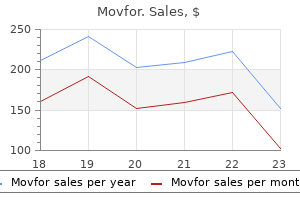
Order 200 mg movfor visa
Many patients obtain satisfactory relief of symptoms with these nonoperative measures hiv infection rate with condom order movfor 200 mg amex. For women who do not achieve a satisfactory response, surgical treatment (vestibuloplasty) provides good results in about 75% of patients. Bacterial vaginosis and trichomoniasis are risk factors for cuff cellulitis after abdominal hysterectomy. The role of the physical examination in diagnosing common causes of vaginitis: a prospective study. Evaluation of a deoxyribonucleic acid probe for the detection of Trichomonas vaginalis in vaginal secretions. In vitro drug susceptibility and doses of metronidazole required for cure in cases of refractory vaginal trichomoniasis. Trichomoniasis in a postmenopausal woman cured after discontinuation of estrogen replacement therapy. Vaginitis due to Saccharomyces cerevisiae: epidemiology, chemical aspects, and therapy. Over-the-counter antifungal drug misuse associated with patient-diagnosed vulvovaginal candidiasis. Haemophilus vaginalis vaginitis: a newly defined specific infection previously classified "nonspecific" vaginitis. Nonspecific vaginitis: diagnostic criteria and microbial and epidemiologic associations. Comparison of clindamycin phosphate vaginal cream with triple sulfonamide vaginal cream in the treatment of bacterial vaginosis. Association between bacterial vaginosis and preterm delivery of a lowbirth-weight infant. Indications for therapy and treatment recommendations for bacterial vaginosis in non-pregnant women: a synthesis of data. Desquamative inflammatory vaginitis: a new subgroup of purulent vaginitis responsive to topical 2% clindamycin therapy. Bacterial vaginosis is a strong predictor of Neisseria gonorrhoeae and Chlamydia trachomatis infection. Medical and legal implications of testing for sexually transmitted infections in children. Use of a lactoferrin assay in the differential diagnosis of female genital tract infections and implications for the pathophysiology of bacterial vaginosis. Rapid antigen testing compares favorably with transcription-mediated amplification assay for the detection of Trichomonas vaginalis in young women. Impact of Trichomonas vaginalis transcription-mediated amplificationbased analyte-specific-reagent testing in a metropolitan setting of high sexually transmitted diseases prevalence. Trichomonas vaginalis vaginitis in obstetrics and gynecology practice: new concepts and controversies.
Diseases
- Neurocysticercosis
- Pellagra
- Livedoid dermatitis
- Myopathy with lysis of myofibrils
- Central nervous system protozoal infections
- Pulmonary artery familial dilatation
- Oculodentodigital dysplasia dominant
- Achalasia alacrimia syndrome
200 mg movfor purchase with mastercard
Clinical Manifestations of Herpes Zoster Ophthalmicus Corneal manifestations of ocular vaccinia range from mild superficial punctate keratitis to interstitial or stromal keratitis hiv infection nhs cheap 200 mg movfor overnight delivery, to disciform keratitis with keratic precipitates, to necrosis with perforation. As with epithelial herpes simplex or varicella-zoster keratitis, corneal epithelial vaccinia lesions stain with rose bengal early in the course of the disease and with fluorescein as an epithelial defect evolves. Direct infection of the corneal epithelium with vaccinia may present as multiple punctate lesions, as dendritiform lesions, or in a geographic pattern. All forms of vaccinia epithelial keratitis may closely resemble that seen with herpes simplex. Stromal keratitis caused by vaccinia may initially appear as scattered subepithelial opacities similar to that seen in epidemic keratoconjunctivitis. This pattern may evolve to ring infiltrates, ulceration, or stromal necrosis or scarring, which must be differentiated from Acanthamoeba, herpes zoster, and herpes simplex stromal keratitis. The keratitis may have an early epithelial component, followed by a later subepithelial stage. A watery discharge, photophobia, and foreign body sensation is often accompanied by a hemorrhagic conjunctivitis with membrane formation. Corneal Anesthesia Corneal sensation may be markedly diminished in even the mildest cases of clinically manifest herpes zoster keratitis. As the corneal epithelium becomes progressively more unhealthy, oval epithelial defects may develop in the palpebral fissure or lower corneal area, with subsequent melting and corneal thinning. Neovascularization in these cases is a good sign and should be allowed to take place because healing often accompanies the process. Because many of these eyes are poor surgical risks, it is unlikely that a corneal graft would be successful. Pharyngoconjunctival fever may begin in one eye but usually involves both eyes eventually. Keratitis associated with hemorrhagic conjunctivitis caused by enterovirus 70 is discussed in Chapter 174. There may be a twofold reason for this: First, a number of viral conditions are self-limited with relatively minor deleterious effects on the cornea, and second, the research and production of antiviral agents have not led to many viable treatment options, especially compared with those for bacterial keratitis. The management plan for both herpes simplex and herpes zoster has undergone many changes as more antiviral agents and information from basic research and clinical trials become available. Data in the normal population indicate that the incidence of zoster is much lower in vaccinated healthy children and adults compared with those who have suffered a natural infection. One question that continues to be raised is, should every patient with herpes zoster receive antiviral treatment Therapy for Ocular Vaccinia During the previous era of routine smallpox vaccination, the treatment of ocular vaccinia was based predominantly on anecdotal reports of the use of vaccinia immune globulin alone or in combination with idoxuridine or topical interferon. Many of these isolated case reports were before the availability of more effective topical antivirals, such as trifluridine and vidarabine. In the absence of masked, controlled clinical trials, a meaningful meta-analysis of the literature is not possible. Because ocular vaccinia virus infections are generally self-limited, treatment should be directed toward shortening the course and limiting the severity of the disease.
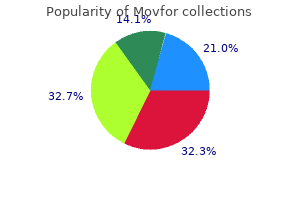
Generic movfor 200 mg
General paresis has prominent encephalopathic signs and may have ocular signs as well antiviral and antibiotics buy 200 mg movfor with amex. Tabes dorsalis has prominent spinal cord signs and symptoms with radicular pain ("lightning pains") that sets its symptoms apart from the usual patient with chronic meningitis, in whom spinal cord symptoms are uncommon. Some of these patients will have a waxing and waning course, perhaps beginning when they had secondary syphilis. Sensitivity and specificity vary so widely that clinical decisions are difficult to make without knowing the performance characteristics of the test. Ingestion of unpasteurized dairy products from other countries, such as soft cheeses, is a common source of infection in the United States. Serum Brucella agglutinins and an exposure history are helpful to screen patients. Serologic studies for brucellosis other than agglutininbased tests are not recommended. Acanthamoeba Granulomatous Meningitis Unlike Naegleria, which causes acute meningitis, cerebral manifestations of Acanthamoeba (see Chapter 275) infections evolve over a few weeks, with decreased mental status, seizures, fever, headache, meningitis, visual disturbance, and ataxia, with hemiparesis as a later manifestation. Angiostrongylus cantonensis Meningitis Most cases of meningitis caused by Angiostrongylus cantonensis (see Chapter 292) in the United States have been in travelers recently returned from the South Pacific, Hawaii, or the Caribbean who acquired infection from eating uncooked produce. Taenia solium Meningitis In patients with neurocysticercosis (see Chapter 291), the cystic lesions can occur anywhere in the neuraxis, usually causing seizures, but patients occasionally present with chronic meningitis. A cyst in the third ventricle can obstruct the aqueduct of Sylvius, and patients can present with hydrocephalus. Enteroviruses (see Chapter 174) cause acute aseptic meningitis or myelitis in children and young adults. Patients with X-linked agammaglobulinemia or with large B-cell lymphoma treated with rituximab may acquire chronic enteroviral meningoencephalitis. These same findings in the immediate postoperative period are difficult to distinguish from the usual postoperative findings. Persistence of these findings, particularly if a plastic implant was used, increases the likelihood of infection with a low-grade pathogen, most often Staphylococcus epidermidis. Although the lymphoma may be known from other sites in the body, distinguishing lymphoma in the meninges from cryptococcal meningitis or other infectious causes is obviously vital. Sarcoidosis Meningitis Chapter 90 ChronicMeningitis Chronic meningitis due to sarcoidosis is a diagnosis of exclusion, with many patients reported to have that diagnosis even in the absence of extraneural signs of sarcoidosis. Treatment with corticosteroids may reveal a fungal or other infectious cause of the meningitis. Vogt-Koyanagi-Harada Syndrome Meningitis Vogt-Koyanagi-Harada syndrome is presumably an autoimmune disease consisting of bilateral eye disease, chronic meningitis, and, later in the course, skin findings.
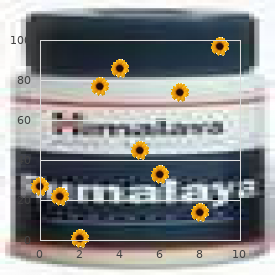
Generic 200 mg movfor with mastercard
Cerebral aspergillosis is reported in 10% to 20% of all cases of invasive aspergillosis hiv infection per country order 200 mg movfor with amex, and only rarely is the brain the only site of infection. Many predisposing conditions to mucormycosis have been described, including diabetes mellitus (70% of cases) usually in association with acidosis, acidemia from profound systemic illnesses. The order Mucorales includes many species that have caused brain lesions (see Chapter 260), with Rhizopus arrhizus (oryzae) being one of the most common. One recent case was observed in a patient who underwent extracorporeal membrane oxygenation. Many of the melanized, or dematiaceous, fungi have also been reported to cause brain abscess, including, in particular, Cladophialophora bantiana, Bipolaris hawaiiensis, Bipolaris spicifera, Exophiala (Wangiella) dermatitidis, Ochroconis gallopava (Dactylaria constricta var. In addition, free-living amebas (Naegleria species, Acanthamoeba species, and Balamuthia species) are preferentially neurotropic. Neurocysticercosis, caused by the larval form of Taenia solium, is a major cause of brain lesions in the developing world. In another study of 43 patients who survived low-velocity missile injuries of the brain during military conflicts and who had retained intracranial fragments,107 suppurative sequelae were seen in 6 patients, and 2 of these progressed to brain abscess. Traumatic predisposing conditions to brain abscess in the civilian population (incidence of 2. Few studies have focused on the identification of the specific virulence factors of microorganisms that produce brain abscess. Contrary to common views, the brain may be more susceptible to infection than many other tissues. Compared with skin, the brain is significantly more susceptible to appropriate bacterial challenge; this was studied in a rat model of experimental brain abscess. The role of the capsule among other bacterial species in the pathogenesis of brain abscess has not been evaluated. This discrepancy may be explained because brain abscess is often a result of contiguous spread of chronic otitic or sinus infections, and the synergistic infectivity of mixed populations of anaerobes plus a facultative organism may be necessary to establish the disease. The role of other bacterial virulence factors in brain abscess formation has not been evaluated. Despite extensive evidence implicating bacterial lipopolysaccharide in the pathogenesis of bacterial meningitis (see Chapter 89), similar studies on the effect, if any, of lipopolysaccharide on brain abscess formation and evolution are unavailable. An additional concern is the formation of brain abscesses in patients with bacterial meningitis.
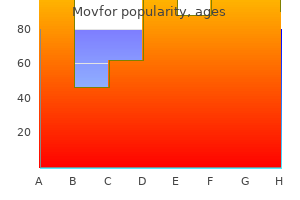
Order movfor canada
The importance of endometrial cultures for aerobes kleenex anti viral 112 200 mg movfor visa, anaerobes, and mycoplasmas will increase as antimicrobial resistance to clindamycin grows among isolates of gramnegative anaerobes. Careful physical examination is the most important to distinguish between pelvic and nonpelvic causes of fever. All health care workers present at the delivery and those who performed vaginal examinations before delivery should be screened with cultures of the nares, throat, vagina, rectum, and skin. Any health care worker who is culture positive for group A streptococcus should refrain from patient care for the first 24 hours of antimicrobial therapy. If surveillance identifies additional patients or health care workers with positive cultures for group A streptococcus, the isolates should be typed by sequencing the variable portion of the M-protein gene or other molecular methods to identify the strain. Heparin levels were therapeutic at a mean of less than 24 hours (range, 6 to 24 hours). Taken together, these studies suggest that patients with refractory postpartum fever require more time to resolve their persistent fever than their more responsive counterparts and that anticoagulation does not speed this process along. Antibiotics should be discontinued in patients with persistent fever who look well, have a normal pelvic examination, and have no leukocytosis, considering the diagnosis of drug fever. More prolonged antibiotic therapy (5 to 6 days) with or without adjunct heparin therapy should be anticipated in those patients with persistent fever, continued pelvic organ tenderness, and persistent leukocytosis. Modern obstetrics therefore deals with spontaneous perineal lacerations after vaginal delivery. A recent report suggests that women with third- and fourth-degree perineal tears have a lower rate of perineal wound complications if they receive antibiotic prophylaxis with cefoxitin or cefotetan at the time of repair. The simple episiotomy infection is a local infection that is limited to the skin and superficial fascia along the episiotomy incision. In contrast to deeper infection, the associated skin changes of edema and erythema occur only adjacent to the episiotomy. The simple episiotomy infection may initially be treated with broad-spectrum antibiotics with activity against streptococci, staphylococci, Enterobacteriaceae, and anaerobes, including Bacteroides fragilis. Ramin and colleagues40 showed that with proper preoperative care, simple episiotomy infection is not a contraindication to early repair of dehiscence. The more common is superficial fascia infection without necrosis, the clinical presentation of which is neither striking nor distinctive. The skin may be erythematous and edematous, but severe systemic manifestations do not occur.
Sabal (Saw Palmetto). Movfor.
- Dosing considerations for Saw Palmetto.
- What is Saw Palmetto?
- How does Saw Palmetto work?
- Are there any interactions with medications?
- What other names is Saw Palmetto known by?
- Enlarged prostate (benign prostatic hyperplasia; BPH). There is conflicting and contradictory research about the benefits of saw palmetto for prostate symptoms. Some research has shown that saw palmetto might modestly improve symptoms such as going to the bathroom at night in some men. But higher quality and more reliable research seems to indicate that saw palmetto has little or no benefit for reducing these symptoms. Any benefit is modest at best.
- Treating nonbacterial prostatitis/chronic pelvic pain syndrome, increasing breast size, hair growth, colds and coughs, sore throat, asthma, chronic bronchitis, prostate cancer, and migraine headache.
Source: http://www.rxlist.com/script/main/art.asp?articlekey=96932
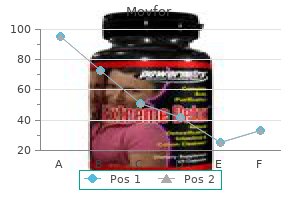
Cheap movfor master card
Eye findings typically include white retinal infiltrates; retinal vasculitis antiviral flu 200 mg movfor order fast delivery, which may have a frosted branch angiitis pattern; and multiple retinal hemorrhages. An important clinical feature is the absence of significant vitreous inflammation. The incidence of ocular syphilis appears to be increasing, coincident with the rising incidence of syphilis. Syphilis may produce anterior uveitis, intermediate uveitis, posterior uveitis, or panuveitis. Syphilitic anterior uveitis is granulomatous in two thirds of patients32 and bilateral in half. Interstitial keratitis, iris nodules, dilated iris vessels, and iris atrophy may be seen. The most common form of posterior uveitis is multifocal chorioretinitis, but other manifestations include focal chorioretinitis, pseudoretinitis pigmentosa, retinal necrosis, neuroretinitis, and optic neuritis. A pale optic nerve head from prior syphilitic optic neuritis may mimic glaucomatous optic atrophy. Chorioretinitis was the type of uveitis seen in 15 of 20 patients with syphilitic posterior uveitis in one review. Typical findings in congenital disease include interstitial keratitis and so-called salt-and-pepper fundi. Interstitial keratitis does not usually occur until the patient is a teenager or young adult. In acquired syphilis, onset of uveitis may occur in secondary or tertiary syphilis. The most common ocular finding in secondary syphilis is iritis, which accounts for more than 70% of eye findings. In contrast, when ocular syphilis develops in tertiary disease, patients often have slowly progressive decrease in vision as their only symptom. In contrast to patients with secondary disease, patients with tertiary disease are often middle-aged or older. They often have no knowledge of prior exposure to syphilis, which likely occurred decades earlier. It is possible, however, that some patients from areas endemic for yaws or bejel have positive serologies due to exposure to these nonvenereal T. These kits vary in specificity and sensitivity, with false positives being common in low-risk populations.
Movfor 200 mg sale
Steps of food preparation antiviral valacyclovir side effects purchase movfor once a day, holding temperatures, and hygienic circumstances in the kitchen are assessed. Investigation into the sources of food ingredients may lead to assessments of the originating farm or processing plant. These assessments may result in changes in industry practices to prevent future illnesses. In addition, as guided by epidemiologic findings, samples from leftover food, the food preparation environment, and food handlers may be examined. Specimen types vary by etiologic agent, and proper specimen collection and transport are important to successful diagnosis198; guidance is available at To date, detection of infectious agents in the clinical setting has been performed nearly entirely by isolating bacterial pathogens in culture, by visualizing parasites by microscopy, or, in more recent years, by detecting presence of antigens or toxins of pathogens in stool or food samples by immunoassays. Because some pathogens require specific culture media, culture conditions, or stains, diagnosis may depend on the skill of the clinician or laboratory choosing methods that could identify the causative agent. Some bacterial foodborne pathogens are not readily identified from cultures alone. Therefore, to identify some etiologies, human specimens must be sent to reference laboratories where selective methods are available, and food specimens must be sent to food microbiology laboratories that can detect bacterial or nonbacterial toxins and chemicals. Because of the multipathogen nature of these newer molecular tests, they are likely to increase the number of illnesses for which two or more enteric pathogens are identified. However, it will become increasingly important to interpret positive results in a clinical context because the pathogens detected may not be causing illness. PulseNet is growing internationally, which will enable better detection of outbreaks of international scale,203 and newer molecular subtyping methods may improve the results. If available, multilocus sequence typing,205 plasmid analysis, or serotyping206 may be of value in confirming that isolates were derived from a common source, because 14% of healthy adults have been reported to have transient gastrointestinal colonization with B. However, pathogens identified as part of a routine stool culture typically only include Salmonella, Shigella, Campylobacter, and sometimes E. To identify other bacterial pathogens in culture, the clinical laboratory needs to be notified so that special media can be used. Patients with suspected botulism should be treated before the diagnosis is confirmed. Physicians should specifically request testing for Cyclospora and Cryptosporidium, if indicated, because these pathogens are not typically detected via routine ova and parasite examination and require specialized techniques. In addition, sensitive, commercially available antigen detection and molecular assays exist for Cryptosporidium and Giardia. Additional information on the diagnosis of parasitic infections can be found at Outbreaks caused by heavy metals may be documented by demonstration of the metal in the incriminated food or stool specimens from ill persons. Marine toxin syndromes are diagnosed by clinical presentation and history of seafood consumption in the preceding 24 hours; diagnostic tests are not available in the clinical setting. Mushroom poisonings should be diagnosed by clinical suspicion, and may be confirmed either by the identification of the responsible toxin in gastric contents, blood, urine, or fecal specimens or by the identification of the mushroom by a mycologist. The frequency of outbreaks of unknown etiology may decrease as molecular methods that can detect a wider array of pathogens become increasingly available.
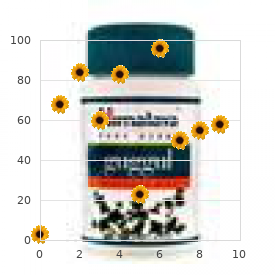
Movfor 200 mg with mastercard
Successfully treated Candida krusei infection of the lumbar spine with combined caspofungin/posaconazole therapy antiviral kleenex discount movfor 200 mg fast delivery. Successful treatment of Candida tropicalis arthritis, osteomyelitis and costochondritis with caspofungin and fluconazole in a recipient of bone marrow transplantation. Candida tropicalis arthritis of the knee in a patient with acute lymphoblastic leukaemia: successful treatment with caspofungin. Successful treatment of prosthetic knee Candida glabrata infection with caspofungin combined with flucytosine. Echinocandin resistance in Candida species: mechanisms of reduced susceptibility and therapeutic approaches. Drug treatment of multidrug-resistant osteoarticular tuberculosis: a systematic literature review. Clinical value of polymerase chain reaction in the diagnosis of joint tuberculosis 358. Clinical and pathological characteristics of mycobacterial tenosynovitis and arthritis. Arthritis due to Mycobacterium xenopi: a retrospective study of 7 cases in France. Skin and joint infection by Mycobacterium chelonae: rescue treatment with interferon gamma. Granulomatous synovialitis with erosions in the shoulder joint: a rare case of polyarthritis caused by Mycobacterium kansasii. Candida glabrata olecranon bursitis treated with bursectomy and intravenous caspofungin. Septic subacromial bursitis caused by Mycobacterium kansasii in an immunocompromised host. Olecranon bursitis due to Prototheca wickerhamii, an algal opportunistic pathogen. Endoscopic bursectomy for the treatment of septic pre-patellar bursitis: a case series. Despite advances in surgical and medical management of osteomyelitis, it is still considered one of the most difficult to treat infectious diseases. Progressive destruction of the bone and the formation of sequestra are characteristics of this disease. Osteomyelitis can develop as the result of contiguous spread from adjacent soft tissues and joints, hematogenous seeding, or direct inoculation of microorganisms into the bone as a result of trauma or surgery. Staphylococcus aureus, the most common microorganism recovered in osteomyelitis, preferentially causes this disease by expressing high-affinity adhesins to components of bone matrix that express fibronectin, laminin, collagen, or sialoglycoprotein.
Purchase movfor 200 mg on-line
Patients with intermediate uveitis present with floaters or blurred vision but typically no pain or photophobia hiv infection cd4 count movfor 200 mg buy lowest price. The aqueous is quiet, but vitreous cells are characteristic and are often clumped into so-called snowballs. In posterior uveitis, patients often have painless loss of vision as their primary symptom. There are usually few cells in the anterior chamber, but the funduscopic examination shows lesions in the retina or choroid, or both. Panuveitis is characterized by a combination of the previously mentioned findings. Funduscopic photograph of acute retinal necrosis showing loss of retinal features in the peripheral retina due to retinal necrosis. Anterior chamber inflammation may be mild to severe, and there may be a hypopyon or keratic precipitates, or both; keratic precipitates may be small, large, or stellate. These include unilateral disease, decreased corneal sensation, posterior synechiae, acute increase in intraocular pressure (from inflammation of the trabecular meshwork), and iris atrophy (either patchy, sectoral, or diffuse). In some cases, recurrence of anterior uveitis has occurred while on therapy, as well as soon after stopping the medication. Patients may have mild eye pain or photophobia, then decreased vision in the affected eye. Funduscopic examination with an indirect ophthalmoscope shows one or more foci of retinal necrosis in the peripheral retina, an area not usually seen with a direct ophthalmoscope. The areas of retinitis have sharply demarcated borders and typically spread circumferentially and posteriorly. Patients present with vision loss that may be unilateral or bilateral, and examination shows multiple peripheral lesions in the deep (outer) layers of the retina initially. A few recent successes have been achieved by a combination of systemic and intravitreal therapy (see "Therapy"). Additionally, some authors maintain that uveitis may be a late manifestation of yaws or bejel. The possible distinction would be important to the patient because of social implications, although it would not change therapy. Patients presented with conjunctival involvement, subretinal abscess, choroidal tubercles, and panophthalmitis. Active or healed choroiditis was found in 78%44 and 94%45 of patients with systemic disease and presumed ocular tuberculosis in two reports. In earlier studies, choroidal involvement was seen in 30% to 40% of similar patients.
Grubuz, 22 years: Pediatric retropharyngeal lymphadenitis: differentiation from retropharyngeal abscess and treatment implications.
Tom, 46 years: Presentations vary from subclinical mucosal shedding to overwhelming sepsis or encephalitis.
Snorre, 63 years: A panel of serologic responses (dye test, IgM, IgA, IgE enzyme-linked immunosorbent assay, and IgG avidity testing based on preferential binding to acetone vs.
Amul, 25 years: However, ciprofloxacin is still better than the third- and fourthgeneration fluoroquinolones against gram-negative bacteria, including P.
Milok, 51 years: Pneumococcal trafficking across the blood-brain barrier: molecular analysis of a novel bidirectional pathway.
Cruz, 55 years: The intravenous form very commonly causes renal failure, neutropenia, as well as rash and gastrointestinal distress owing to concurrent probenecid dosing.
Josh, 24 years: The knees, wrists, and ankles are most 1308 commonly affected, and monarthritis is more common than polyarthritis.
Bufford, 53 years: Matrix proteins can also influence a diverse set of cellular functions, such as inhibition of host cell transcription28,29 and evasion of the cellular innate antiviral response.
Kafa, 60 years: The hallmark of osteomyelitis after open fracture is nonunion of the fracture site or poor wound healing after wound closure or soft tissue coverage.
Jorn, 42 years: Adherence traits of Escherichia coli, alone and in association with other stool pathogens: potential role in pathogenesis of persistent diarrhea in an urban Brazilian slum.
Mitch, 21 years: The hyperplastic appearance of such nodes may be so prominent as to suggest erroneously a lymphoproliferative disorder.
Sugut, 28 years: This lesion is a round, indurated, ulcerated, painless area with a central gray-black eschar and a surrounding narrow zone of erythema.
Roy, 47 years: Negative pressure wound therapy after severe open fractures: a prospective randomized study.
8 of 10 - Review by X. Cyrus
Votes: 47 votes
Total customer reviews: 47
